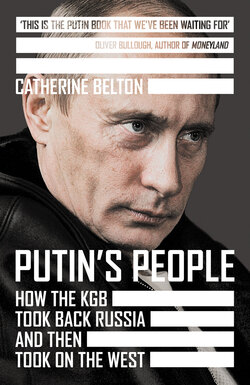Читать книгу Putin’s People - Catherine Belton - Страница 15
Submariner, Soldier, Trader, Spy
ОглавлениеThe KGB men who took over St Petersburg with Putin were far more commercially minded than the generation that had gone before. Though they mourned the collapse of the Soviet empire, many in the younger, middle echelon of the security services like Putin had fast embraced the tenets of capitalism and rejected the dogma of the Communist Party. For this new generation, it had been Communism that failed the empire, leaving them high and dry in Afghanistan and abandoning them in East Germany. ‘They saw Communism as having betrayed them,’ said Andrei Illarionov, the former presidential economic adviser to Putin.[43] They were the product of the operations the KGB launched in the final years of Soviet rule to create networks of foreign firms. The secrecy surrounding these activities meant that from the beginning, the methods of the KGB men of the eighties resembled money-laundering operations.
Once the oil-for-food scheme was done, Putin’s allies began to move in on the sea port, which initially together with the oil terminal and a fleet of ships was part of a vast state holding company known as the Leningrad Baltic Sea Fleet, or BMP. For the St Petersburg KGB men, the BMP had long been a strategic asset and the story of how Putin’s people took it over is inextricably bound up with the forging of an alliance between Putin’s City Hall and the city’s most notorious organised-crime group, the Tambov group. In Soviet times, the KGB had manned the fleet’s ships as trade aides to the captains.[44] They knew intimately its trade routes, its cargoes, the contraband and the money to be made. In its heyday, hundreds of ships had set out from Leningrad carrying oil products, metals and grain, while others arrived from as far away as South America carrying fruit, sugar and smuggled goods, vital for underground operations and cash. In those days, the BMP represented the city’s most strategic cash flow. Even in 1991, the year of the Soviet collapse, its net profits were in the hundreds of millions of dollars.[45] It was not only the owner of nearly two hundred passenger and cargo ships, it also controlled the entire Leningrad sea port, including its oil terminal, as well as the neighbouring ports in Vyborg and Kaliningrad. It was the key to the city’s wealth.
The man who ran the Baltic Sea Fleet at the time of Yeltsin’s revolution, Viktor Kharchenko, was an avowed liberal who under Gorbachev’s perestroika reforms had won the government’s permission to carve out the company as his own fiefdom. Square-jawed and built like a tank, Kharchenko had become increasingly independent. He’d risen from a childhood spent in an orphanage to become one of the city’s most revered businessmen. In 1990, under his watch, the BMP became an enterprise he rented from the state, which kept 50 per cent of its profits for reinvestment.[46] He’d grown close to Yeltsin, and when the Communist regime collapsed in the wake of the failed August putsch, he unceremoniously kicked all the KGB men out of the fleet.[47]
Kharchenko was carving out a separate power base just at the time the St Petersburg KGB men most urgently wanted to keep control of the cash flow. In the chaos of the Soviet collapse, and with organised-crime groups also trying to get a piece of the port and the oil terminal, it took over a year for them to exact their revenge.
One of the first moves was made quietly. Late one evening in February 1993, Viktor Kharchenko was returning home from a meeting with Yeltsin in Moscow when police stopped the Red Arrow train he was travelling on just outside St Petersburg. He was hauled off the train, charged with siphoning $37,000 out of the Baltic Sea Fleet, and jailed.[48]
Kharchenko was released on bail four months later, but he was removed from his post in charge of the BMP. The St Petersburg KGB men installed their own director, sold off the fleet of ships one by one and transferred them to a myriad of offshore companies. In the process, one of the BMP’s directors was shot dead.[49] ‘It was a real raider attack,’ said one of Kharchenko’s associates. ‘They sold off the ships for nothing. Everything disappeared. They siphoned everything out of the country.’[50]
Kharchenko’s former associates still fear to speak of what happened back then, or about who was behind the attack. But the footprints of the local KGB men were everywhere. ‘They needed to clean their boots and eat,’ said one. ‘They didn’t pay attention to anyone. They just took BMP and looted it.’[51]
The raid was a foretaste of operations that were to come later. The KGB men had bent St Petersburg’s law enforcement to their will to take over the city’s most important trading link. Kharchenko had been removed as BMP chief at a crucial moment. At the same time, the port and the oil terminal were being carved out from the Baltic Sea Fleet into separate entities, and privatised by Putin’s City Hall. ‘They pulled out the harbour walls from BMP,’ said a former Kharchenko associate.[52]
